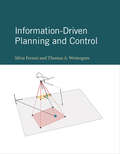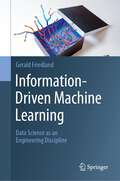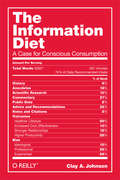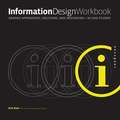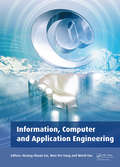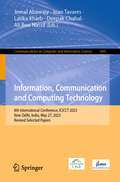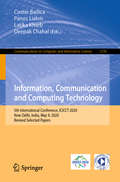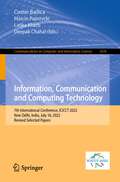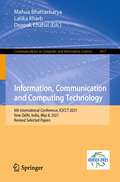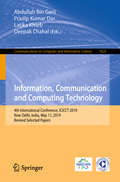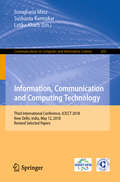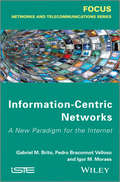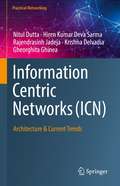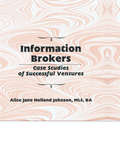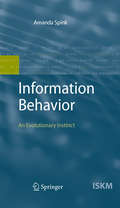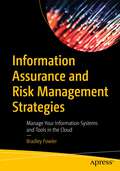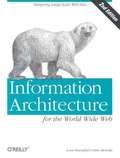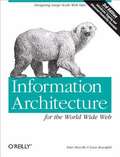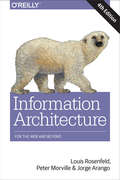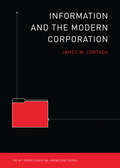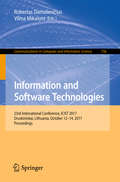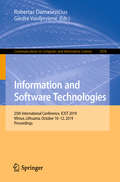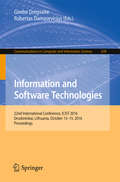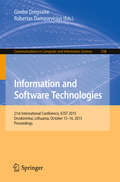- Table View
- List View
Information-Driven Planning and Control (Cyber Physical Systems Series)
by Silvia Ferrari Thomas A. WettergrenA unified framework for developing planning and control algorithms for active sensing, with examples of applications for specific sensor technologies.Active sensor systems, increasingly deployed in such applications as unmanned vehicles, mobile robots, and environmental monitoring, are characterized by a high degree of autonomy, reconfigurability, and redundancy. This book is the first to offer a unified framework for the development of planning and control algorithms for active sensing, with examples of applications for a range of specific sensor technologies. The methods presented can be characterized as information-driven because their goal is to optimize the value of information, rather than to optimize traditional guidance and navigation objectives.
Information-Driven Machine Learning: Data Science as an Engineering Discipline
by Gerald FriedlandThis groundbreaking book transcends traditional machine learning approaches by introducing information measurement methodologies that revolutionize the field. Stemming from a UC Berkeley seminar on experimental design for machine learning tasks, these techniques aim to overcome the 'black box' approach of machine learning by reducing conjectures such as magic numbers (hyper-parameters) or model-type bias. Information-based machine learning enables data quality measurements, a priori task complexity estimations, and reproducible design of data science experiments. The benefits include significant size reduction, increased explainability, and enhanced resilience of models, all contributing to advancing the discipline's robustness and credibility. While bridging the gap between machine learning and disciplines such as physics, information theory, and computer engineering, this textbook maintains an accessible and comprehensive style, making complex topics digestible for a broad readership. Information-Driven Machine Learning explores the synergistic harmony among these disciplines to enhance our understanding of data science modeling. Instead of solely focusing on the "how," this text provides answers to the "why" questions that permeate the field, shedding light on the underlying principles of machine learning processes and their practical implications. By advocating for systematic methodologies grounded in fundamental principles, this book challenges industry practices that have often evolved from ideologic or profit-driven motivations. It addresses a range of topics, including deep learning, data drift, and MLOps, using fundamental principles such as entropy, capacity, and high dimensionality. Ideal for both academia and industry professionals, this textbook serves as a valuable tool for those seeking to deepen their understanding of data science as an engineering discipline. Its thought-provoking content stimulates intellectual curiosity and caters to readers who desire more than just code or ready-made formulas. The text invites readers to explore beyond conventional viewpoints, offering an alternative perspective that promotes a big-picture view for integrating theory with practice. Suitable for upper undergraduate or graduate-level courses, this book can also benefit practicing engineers and scientists in various disciplines by enhancing their understanding of modeling and improving data measurement effectively.
The Information Diet
by Clay A. JohnsonThe modern human animal spends upwards of 11 hours out of every 24 in a state of constant consumption. Not eating, but gorging on information ceaselessly spewed from the screens and speakers we hold dear. Just as we have grown morbidly obese on sugar, fat, and flour--so, too, have we become gluttons for texts, instant messages, emails, RSS feeds, downloads, videos, status updates, and tweets. We're all battling a storm of distractions, buffeted with notifications and tempted by tasty tidbits of information. And just as too much junk food can lead to obesity, too much junk information can lead to cluelessness. The Information Diet shows you how to thrive in this information glut--what to look for, what to avoid, and how to be selective. In the process, author Clay Johnson explains the role information has played throughout history, and why following his prescribed diet is essential for everyone who strives to be smart, productive, and sane. In The Information Diet, you will: Discover why eminent scholars are worried about our state of attention and general intelligence Examine how today's media--Big Info--give us exactly what we want: content that confirms our beliefs Learn to take steps to develop data literacy, attention fitness, and a healthy sense of humor Become engaged in the economics of information by learning how to reward good information providers Just like a normal, healthy food diet, The Information Diet is not about consuming less--it's about finding a healthy balance that works for you
The Information Diet: A Case for Conscious Comsumption
by Clay A. JohnsonThis is a softcover version of the title released in 2011; there is no new material.The modern human animal spends upwards of 11 hours out of every 24 in a state of constant consumption. Not eating, but gorging on information ceaselessly spewed from the screens and speakers we hold dear. Just as we have grown morbidly obese on sugar, fat, and flour—so, too, have we become gluttons for texts, instant messages, emails, RSS feeds, downloads, videos, status updates, and tweets.We're all battling a storm of distractions, buffeted with notifications and tempted by tasty tidbits of information. And just as too much junk food can lead to obesity, too much junk information can lead to cluelessness. The Information Diet shows you how to thrive in this information glut—what to look for, what to avoid, and how to be selective. In the process, author Clay Johnson explains the role information has played throughout history, and why following his prescribed diet is essential for everyone who strives to be smart, productive, and sane.In The Information Diet, you will:Discover why eminent scholars are worried about our state of attention and general intelligence. Examine how today’s media—Big Info—give us exactly what we want: content that confirms our beliefs. Learn to take steps to develop data literacy, attention fitness, and a healthy sense of humor. Become engaged in the economics of information by learning how to reward good information providers. Just like a normal, healthy food diet, The Information Diet is not about consuming less—it’s about finding a healthy balance that works for you
Information Design Workbook: Graphic Approaches, Solutions, and Inspiration + 30 Case Studies
by Kim Baer<p>New in paperback, this workbook is a methodical yet comprehensive approach to conveying the fundamentals of avant-garde, innovative, information design by examining history, theory, criticism, technology and media, process, method, and practice. <p>Opening with a very brief history followed by an instructive breakdown of the discipline, readers get an intimate understanding of the complexities of crafting information design to effectively improve communication both functionally and aesthetically. The back half of the book contains a wide range of case studies from design firms around the world so designers can see the techniques previously outlined in the first half of the book. The author also critiques and explains why the design is successful in terms of formal quality (Aesthetics) and function (How does it improve communication?).</p>
Information, Computer and Application Engineering: Proceedings of the International Conference on Information Technology and Computer Application Engineering (ITCAE 2014), Hong Kong, China, 10-11 December 2014 (Routledge Revivals)
by Hsiang-Chuan Liu Wen-Pei Sung Wenli YaoThis proceedings volume brings together peer-reviewed papers presented at the International Conference on Information Technology and Computer Application Engineering, held 10-11 December 2014, in Hong Kong, China. Specific topics under consideration include Computational Intelligence, Computer Science and its Applications, Intelligent Information Processing and Knowledge Engineering, Intelligent Networks and Instruments, Multimedia Signal Processing and Analysis, Intelligent Computer-Aided Design Systems and other related topics. This book provides readers a state-of-the-art survey of recent innovations and research worldwide in Information Technology and Computer Application Engineering, in so-doing furthering the development and growth of these research fields, strengthening international academic cooperation and communication, and promoting the fruitful exchange of research ideas. This volume will be of interest to professionals and academics alike, serving as a broad overview of the latest advances in the dynamic field of Information Technology and Computer Application Engineering.
Information, Communication and Computing Technology: 8th International Conference, ICICCT 2023, New Delhi, India, May 27, 2023, Revised Selected Papers (Communications in Computer and Information Science #1841)
by Jemal Abawajy Joao Tavares Latika Kharb Deepak Chahal Ali Bou NassifThis book constitutes the refereed proceedings of the 8th International Conference on Information, Communication and Computing Technology, ICICCT 2023, held in New Delhi, India, during May 27, 2023.The 14 full papers included in this book were carefully reviewed and selected from 60 submissions. They were organized in topical sections as follows: global platform for researchers, scientists and practitioners from both academia and industry to present their research and development activities in all the aspects of Pattern Recognition and computational Intelligence techniques.
Information, Communication and Computing Technology: 5th International Conference, ICICCT 2020, New Delhi, India, May 9, 2020, Revised Selected Papers (Communications in Computer and Information Science #1170)
by Costin Badica Panos Liatsis Latika Kharb Deepak ChahalThis book constitutes the refereed proceedings of the 5th International Conference on Information, Communication and Computing Technology, ICICCT 2020, held in New Delhi, India*, in May 2020.The 24 full papers and one short paper presented in this volume were carefully reviewed and selected from 220 submissions. The papers are organized in topical sections on data communication & networking; advanced computing using machine learning.*The conference was held virutally due to the COVID-19 pandemic.
Information, Communication and Computing Technology: 7th International Conference, ICICCT 2022, New Delhi, India, July 16, 2022, Revised Selected Papers (Communications in Computer and Information Science #1670)
by Costin Badica Marcin Paprzycki Latika Kharb Deepak ChahalThis book constitutes proceedings of the 7th International Conference on Information, Communication and Computing Technology, ICICCT 2022, held in New Delhi, India, in July 2022.The 11 papers presented in this volume were carefully reviewed and selected from 65 submissions. The papers cover a great variety of topics, such as wireless networks, deep learning, machine learning, neural networks, natural language processing, sentiment analysis, network security, image processing, image augmentation and others. The contributions are divided into the following thematic blocks: Networking and Communication; Evolutionary Computing through Machine Learning.
Information, Communication and Computing Technology: 6th International Conference, ICICCT 2021, New Delhi, India, May 8, 2021, Revised Selected Papers (Communications in Computer and Information Science #1417)
by Mahua Bhattacharya Latika Kharb Deepak ChahalThis book constitutes the refereed proceedings of the 6th International Conference on Information, Communication and Computing Technology, ICICCT 2021, held in New Delhi, India, in May 2021.The 16 full papers and 4 short paper presented in this volume were carefully reviewed and selected from 83 qualified submissions. The papers are organized in topical sections on communication and network systems; computational intelligence techniques.
Information, Communication and Computing Technology: 4th International Conference, ICICCT 2019, New Delhi, India, May 11, 2019, Revised Selected Papers (Communications in Computer and Information Science #1025)
by Abdullah Bin Gani Pradip Kumar Das Latika Kharb Deepak ChahalThis book constitutes the refereed proceedings of the 4th International Conference on Information, Communication and Computing Technology, ICICCT 2019, held in New Delhi, India, in May 2019.The 23 full papers and one short paper presented in this volume were carefully reviewed and selected from 120 submissions. The papers are organized in topical sections on communication and network systems; and emerging computing technologies.
Information, Communication and Computing Technology: Third International Conference, ICICCT 2018, New Delhi, India, May 12, 2018, Revised Selected Papers (Communications in Computer and Information Science #835)
by Sonajharia Minz Sushanta Karmakar Latika KharbThis book constitutes the refereed proceedings of the Third International Conference on Information, Communication and Computing Technology, ICICCT 2018, held in New Delhi, India, in May 2018. The 18 revised full papers presented in this volume were carefully reviewed and selected from 295 submissions. The papers are organized in topical sections on communication and network systems and emerging computing technologies.
Information-Centric Networks: A New Paradigm for the Internet
by Gabriel M. de Brito Pedro B. Velloso Igor M. MoraesSince its inception, the Internet has evolved from a textual information system towards a multimedia information system, in which data, services and applications are consumed as content. Today, however, the main problem faced is that applications are now content-oriented but the protocol stack remains the same, based on the content location. Thus, it is clear that the Internet’s current architecture must change. This new architecture should take into account aspects to improve content location and delivery efficiency and also content availability. Fulfilling these requirements is the main goal of information-centric networks (ICNs). ICN is a new communication paradigm to increase the efficiency of content delivery and also content availability. In this new concept, the network infrastructure actively contributes to content caching and distribution. This book presents the basic concepts of ICNs, describes the main architecture proposals for these networks, and discusses the main challenges to their development. Information Centric-Networks looks at the current challenges for this concept, including: naming, routing and caching on the network-core elements, several aspects of content security, user privacy, and practical issues in implementing ICNs. Contents 1. Content Distribution on the Internet. 2. Information-Centric Networks. 3. Main ICN Architectures. 4. Challenges. 5. Practical Issues. About the Authors Gabriel M. Brito is an Engineer at Petrobras in Brazil and studying for a Master’s degree at the Universidade Federal Fluminense in Brazil. Pedro Braconnot Velloso is an Associate Professor in the Department of Computer Science at the Universidade Federal Fluminense (UFF), Brazil. He worked for Bell Labs France as a research engineer from 2009 to 2011. Igor M. Moraes is an Associate Professor at the Universidade Federal Fluminense in Brazil.
Information Centric Networks: Architecture & Current Trends (Practical Networking)
by Nitul Dutta Hiren Kumar Sarma Rajendrasinh Jadeja Krishna Delvadia Gheorghita GhineaThis book aimed at bringing an insight to the ICN network, particularly various architectures, issues and challenges in the new networking paradigm. The book starts with an introduction to the new promising concept of ICN and its origin along with the reason behind this interesting innovation. Different architectures proposed so far in support of implementing the ICN is also discussed in details. Few of the challenges of ICN implementation are enlisted as caching, naming, routing, and security. Each of these challenges with recent development is covered in individual chapters. Moreover, integration of current trends in communication and computing like software defined networking and machine learning approach are another area that this book is focusing. All these chapters highlight the recent developments reported in the area and also discusses the future trends. The book provides an overview of the recent developments in future internet technologies, bringing together the advancements that have been made in ICN. The book includes three unique chapters in the field of ICN research. The first, is the SDN framework for implementing ICN by decoupling data and control plan. The machine learning models for predicting future trends in network traffic and other management activities is another important chapter. This chapter includes the possibilities of using machine learning models for trend prediction to help network administrators and service providers to take care of unexpected sudden change traffic pattern and user behaviour. The third most vital chapter is the security issues in ICN. This chapter includes various facts that influences the security of ICN. Issues involved in naming, caching and routing are discussed separately along with few recent works in these areas. Various types of attacks in ICN are also part of the discussion. The stated book would be useful for researchers in this area and will work as a reference for future work. Moreover, the content of the book would also be suitable as a supporting material for undergraduate and graduate level courses in computer science and electrical engineering.
Information Brokers: Case Studies of Successful Ventures
by Alice J JohnsonThe perfect guide to jumpstart an information brokerage firm!Here is an instructive guide for any librarian planning to start an information brokerage, whether as an entrepreneur or as a member of a document delivery group in a library. The methods used by successful firms and librarians are gathered together in this helpful book. Information Brokers: Case Studies of Successful Ventures identifies specific skills and relevant characteristics required to establish a successful information brokerage firm, and provides a descriptive model to assist you in running an information brokerage firm as a viable business venture.This guide is full of information gleaned from questionnaires sent to successful information brokerages throughout the United States and from in-depth interviews conducted with the principals of six of these firms. During the interviews, these individuals were questioned about many relevant issues of the field including: establishment of the business company history what specifically made each business a success general concepts concerning information brokering pertinent literature that helped them, and can help youLibrarians looking for a career change or who find their jobs in jeopardy as a result of budget cuts may want to look into the field of information brokerage. With Information Brokers: Case Studies of Successful Ventures, you can discover if the information brokerage field is for you!
Information Behavior
by Amanda SpinkInformation behavior has emerged as an important aspect of human life, however our knowledge and understanding of it is incomplete and underdeveloped scientifically. Research on the topic is largely contemporary in focus and has generally not incorporated results from other disciplines. In this monograph Spink provides a new understanding of information behavior by incorporating related findings, theories and models from social sciences, psychology and cognition. In her presentation, she argues that information behavior is an important instinctive sociocognitive ability that can only be fully understood with a highly interdisciplinary approach. The leitmotivs of her examination are three important research questions: First, what is the evolutionary, biological and developmental nature of information behavior? Second, what is the role of instinct versus environment in shaping information behavior? And, third, how have information behavior capabilities evolved and developed over time? Written for researchers in information science as well as social and cognitive sciences, Spink's controversial text lays the foundation for a new interdisciplinary theoretical perspective on information behavior that will not only provide a more holistic framework for this field but will also impact those sciences, and thus also open up many new research directions.
Information Assurance and Risk Management Strategies: Manage Your Information Systems and Tools in the Cloud
by Bradley FowlerLearn how to deploy information assurance risk management strategies that align with the National Institute of Standards and Technology’s recommendations. This book will show you how to implement information assurance risk management strategies within your organization. Aimed at system administrators and cybersecurity practitioners, author Bradley Fowler first walks you through how to assess known risks in your organization, understand why using a risk mitigation security strategy control profile is essential, and how to create one for your organization. You will then learn how to develop a risk factor table, outlining descriptions for each risk factor within your organization and which software applications you’ll need to rely on for daily business communication and operations. You will also see how to assess and categorize the level of risk within each technology tool, as well as the impact of an information security breach on the organization. As you progress through the book, you'll review privacy issues relating to your organization, develop and manage a privacy compliance risk profile, and develop and manage a privacy compliance control profile. Additionally, you will gain insight into creating a privacy compliance risk mitigation strategy that helps protect your organization even as security threats evolve. Take the first step to safeguarding your company’s highly valuable information assets today! What You'll Learn Understand what information assurance is and how it relates to risk management strategiesAssess, develop, implement, and manage risk management strategies for corporate information systems, technology, and cloud environmentsDevelop and utilize information usage profiles and risk factor tablesUnderstand the value of data encryption and usage of private and public key exchange for information assurance and security Who This Book Is For Information system and cloud architects responsible for developing, implementing, and managing corporate information systems and cloud environments.
Information Architecture for the World Wide Web, 2nd Edition
by Peter Morville Louis RosenfeldWant to design distinctive, cohesive web sites that "work"? This updated bestseller teaches you how to blend aesthetics and mechanics for web sites and intranets that are easy to navigate and appealing to your users, scalable and simple to maintain. Most books on web development concentrate on either the graphics or the technical issues of a site. This book focuses on the framework that holds the two together.
Information Architecture for the World Wide Web
by Peter Morville Louis RosenfeldThe post-Ajaxian Web 2.0 world of wikis, folksonomies, and mashups makes well-planned information architecture even more essential. How do you present large volumes of information to people who need to find what they're looking for quickly? This classic primer shows information architects, designers, and web site developers how to build large-scale and maintainable web sites that are appealing and easy to navigate. The new edition is thoroughly updated to address emerging technologies -- with recent examples, new scenarios, and information on best practices -- while maintaining its focus on fundamentals. With topics that range from aesthetics to mechanics, Information Architecture for the World Wide Web explains how to create interfaces that users can understand right away. Inside, you'll find:An overview of information architecture for both newcomers and experienced practitioners The fundamental components of an architecture, illustrating the interconnected nature of these systems. Updated, with updates for tagging, folksonomies, social classification, and guided navigationTools, techniques, and methods that take you from research to strategy and design to implementation. This edition discusses blueprints, wireframes and the role of diagrams in the design phaseA series of short essays that provide practical tips and philosophical advice for those who work on information architectureThe business context of practicing and promoting information architecture, including recent lessons on how to handle enterprise architectureCase studies on the evolution of two large and very different information architectures, illustrating best practices along the wayHow do you document the rich interfaces of web applications? How do you design for multiple platforms and mobile devices? With emphasis on goals and approaches over tactics or technologies, this enormously popular book gives you knowledge about information architecture with a framework that allows you to learn new approaches -- and unlearn outmoded ones.
Information Architecture: For the Web and Beyond
by Peter Morville Louis Rosenfeld Jorge ArangoInformation architecture (IA) is far more challenging--and necessary--than ever. With the glut of information available today, anything your organization wants to share should be easy to find, navigate, and understand. But the experience you provide has to be familiar and coherent across multiple interaction channels, from the Web to smartphones, smartwatches, and beyond.To guide you through this broad ecosystem, this popular guide--now in its fourth edition--provides essential concepts, methods, and techniques for digital design that have withstood the test of time. UX designers, product managers, developers, and anyone involved in digital design will learn how to create semantic structures that will help people engage with your message.This book includes:An overview of IA and the problems it solves for creating effective digital products and servicesA deep dive into IA components, including organization, labeling, navigation, search, and metadataProcesses and methods that take you from research to strategy, design, and IA implementation
Information and the Modern Corporation (The MIT Press Essential Knowledge series)
by James W. CortadaA guide to information as the transformative tool of modern business.While we have been preoccupied with the latest i-gadget from Apple and with Google's ongoing expansion, we may have missed something: the fundamental transformation of whole firms and industries into giant information-processing machines. Today, more than eighty percent of workers collect and analyze information (often in digital form) in the course of doing their jobs. This book offers a guide to the role of information in modern business, mapping the use of information within work processes and tracing flows of information across supply-chain management, product development, customer relations, and sales. The emphasis is on information itself, not on information technology. Information, overshadowed for a while by the glamour and novelty of IT, is the fundamental component of the modern corporation.In Information and the Modern Corporation, longtime IBM manager and consultant James Cortada clarifies the differences among data, facts, information, and knowledge and describes how the art of analytics has all but eliminated decision making based on gut feeling, replacing it with fact-based decisions. He describes the working style of “road warriors,” whose offices are anywhere their laptops and cell phones are and whose deep knowledge of a given topic becomes their medium of exchange.Information is the core of the modern enterprise, and the use of information defines the activities of a firm. This essential guide shows managers and employees better ways to leverage information—by design and not by accident.
Information and Software Technologies
by Robertas Damaševičius Vilma MikašytėThis book constitutes the refereed proceedings of the 23nd International Conference on Information and Software Technologies, ICIST 2017, held in Druskininkai, Lithuania, in October 2017.The 51 papers presented were carefully reviewed and selected from 135 submissions. The papers are organized in topical sections on information systems; business intelligence for information and software systems; software engineering; information technology applications.
Information and Software Technologies: 25th International Conference, ICIST 2019, Vilnius, Lithuania, October 10–12, 2019, Proceedings (Communications in Computer and Information Science #1078)
by Robertas Damaševičius Giedrė VasiljevienėThis book constitutes the refereed proceedings of the 25th International Conference on Information and Software Technologies, ICIST 2019, held in Vilnius, Lithuania, in October 2019.The 46 papers presented were carefully reviewed and selected from 121 submissions. The papers are organized in topical sections on information systems; business intelligence for information and software systems; information technology applications; software engineering.
Information and Software Technologies
by Giedre Dregvaite Robertas DamaseviciusThis book constitutes the refereed proceedings of the 20th International Conference on Information and Software Technologies, ICIST 2014, held in Druskininkai, Lithuania, in October 2014. The 34 papers presented were carefully reviewed and selected from 68 submissions. The papers are organized in topical sections such as information systems; business intelligence for information and software systems; software engineering; information technology applications.
Information and Software Technologies: 21st International Conference, Icist 2015, Druskininkai, Lithuania, October 15-16, 2015, Proceedings (Communications In Computer And Information Science #538)
by Giedre Dregvaite Robertas DamaseviciusThis book constitutes the refereed proceedings of the 21th International Conference on Information and Software Technologies, ICIST 2015, held in Druskininkai, Lithuania, in October 2015. The 51 papers presented were carefully reviewed and selected from 125 submissions. The papers are organized in topical sections on information systems; business intelligence for information and software systems; software engineering; information technology applications.
